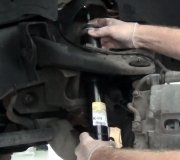Tuesday, April 30th, 2013 AT 8:49 PM
My car started making this sort of low pitched creaking noise at the front end that I can just barely feel through the floor and within the gas pedal. It does not matter whether I am decelerating, accelerating, cruising, turning. It continually makes it. However, because my engine is so loud, it's more pronounced in the lower gears, such as going from 2nd to 1st or vice versa. The noise becomes more apparent the longer I drive, and eventually can be heard even in the 4th gear. At one point my car seemed to have trouble accelerating as the noise was occurring, making it difficult to switch from 2nd to 3rd for instance (i.E. Normally I switch to 2nd when the car reaches 10 mph, to 3rd when it reaches 25 mph, and 4th when it reaches 35 mph. However, in this particular instance it felt as though there was a pull occurring and I wasn't able to transition from 2nd to 3rd until I reached 40 mph.) Also at one point during my drive (when the noise was really bad!) The car was behaving as though I'd gotten a flat tire on the right front end, like a square peg in a round hole sort of feeling if that makes sense, in which I'd pulled over to make sure it wasn't a flat (and it wasn't). I just replaced the brakes on my front end 2 months ago, and don't think they play a role in this issue. Please help!


